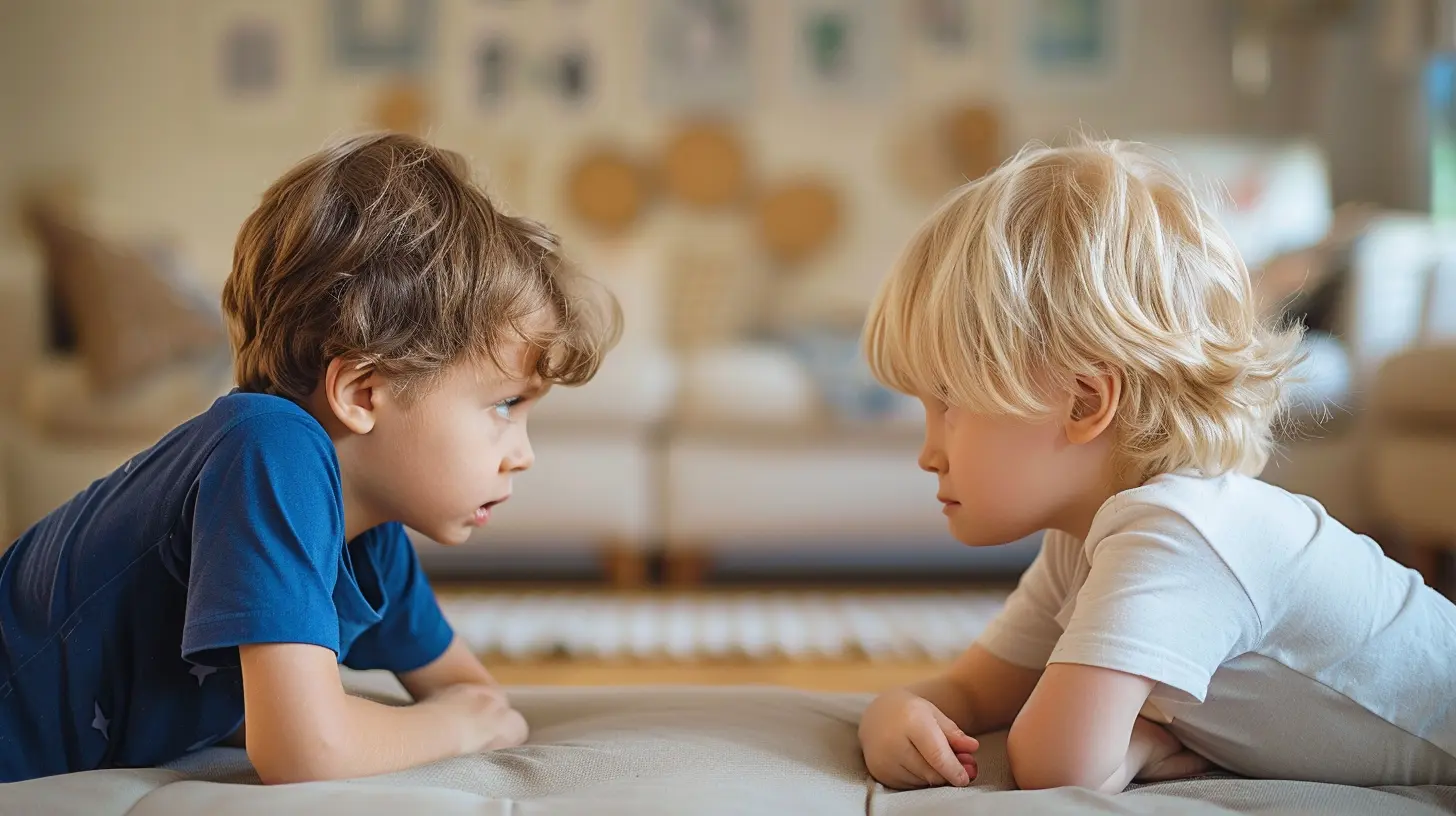Positive Discipline Techniques for Every Age
10 February 2025
Parenting is tough — and disciplining your child? Well, that can feel like walking a tightrope. You've got to find that perfect balance where you're teaching your children right from wrong without squashing their spirit. No one wants to feel like the "bad guy," right?
But here's the good news: you don't have to resort to time-outs or grounding your little one for every misstep. Enter positive discipline techniques, a method that allows parents to teach boundaries while maintaining a respectful and nurturing environment. These strategies aren't your typical "do as I say" mandates. Instead, they focus on guiding your child and helping them develop important life skills.
Ready to dive into what positive discipline looks like at every stage of your child’s development? Let’s go!

The Foundation of Positive Discipline
Before we break it down by age, it’s important to understand what positive discipline actually is. At its core, positive discipline is about teaching children self-control, responsibility, and respect through guidance rather than punishment. It emphasizes maintaining a trusting and loving relationship between parent and child while setting firm, clear expectations.The key principles of positive discipline include:
- Mutual respect: Treating children with dignity and expecting the same in return.
- Understanding the cause: Instead of simply reacting to bad behavior, understanding why it happened.
- Focusing on solutions: Instead of punishment, focus on ways to prevent recurrence.
- Encouragement over praise: Encouragement boosts intrinsic motivation, while praise often focuses on external validation.
- Long-term goals: This isn't about immediate compliance—it’s about shaping long-term behavior and character.
Now that you’ve got the basics, let’s move on to age-appropriate techniques!
Positive Discipline Techniques for Toddlers (Ages 1-3)
Ah, toddlers — the age of boundless energy and endless curiosity. They’re learning to assert their independence (cue the "No!" phase), but they also don’t have the language or skills to manage big emotions. This is where gentle guidance comes in.1.1 Redirection Rather Than Saying "No" Constantly
Let’s face it, toddlers are like little explorers, constantly getting into things they shouldn’t. Your instinct may be to say “no” a thousand times a day. But instead of creating a battle of wills, try redirection. If your toddler is fiddling with something unsafe, gently steer them towards a more appropriate activity.> Example: If your toddler is reaching for your phone, hand them a toy that has buttons to press and make noise.
This way, you're not just telling them what not to do but guiding them towards what they can do.
1.2 Consistency is Key
Toddlers thrive on routine. They feel safe when they know what’s coming next. Clear rules and consistent responses are crucial at this age because it helps them understand boundaries. If you let them throw food one day but scold them the next, they'll be confused and continue testing limits. Stick to a predictable pattern of responses to similar behaviors.1.3 Offer Choices to Empower Them
At this age, kids are eager to assert their independence. Offering limited choices allows them to feel empowered and in control. Make sure the options you provide are ones you're happy with!> Example: Instead of asking, “Do you want to eat dinner?” (which invites refusal), ask, “Would you like carrots or peas with dinner?”
This simple strategy reduces power struggles and makes them more cooperative.
Positive Discipline Techniques for Preschoolers (Ages 3-5)
Preschoolers are more verbal and imaginative, which is awesome but also presents new challenges. They can reason, but their impulse control is still developing. Here’s how to tackle discipline during these years without feeling like you're constantly in a tug-of-war.2.1 Explain the "Why"
Preschoolers are little sponges filled with endless "whys." Take advantage of this curiosity and explain the reason behind rules and boundaries. Instead of giving a command like, “Don’t jump on the couch,” dive into a brief explanation.> Example: “We sit on the couch because if you jump, you could fall and hurt yourself.”
When kids understand the consequences of their actions, they’re more likely to follow the rules.
2.2 Natural Consequences
Instead of handing down arbitrary punishments, let your preschooler experience the natural consequences of their actions (as long as it’s safe to do so). If they throw their toy, it might break, and they'll have to play without it. This helps them understand the impact of their behavior.> Example: "Oh no, you left your book outside. Now it's wet, and we can't read it tonight. Next time, let's remember to bring it in."
It’s an excellent way to teach responsibility without having to raise your voice.
2.3 The Power of Positive Reinforcement
Who doesn’t like a pat on the back? Praise your child for the behaviors you want to see more of. But instead of vague praise like “good job,” be specific.> Example: “I love how you shared your toys with your friend! That was very kind.”
This encourages your child to repeat the positive behavior because they understand what pleased you.
Positive Discipline Techniques for School-Aged Children (Ages 6-12)
Once your child enters school, they're exposed to a whole new social environment. They're learning social skills and gaining independence, but they still need guidance on how to handle their emotions and responsibilities.3.1 Logical Consequences
Logical consequences are a great tool at this stage. They are directly related to the child’s behavior and help teach responsibility.> Example: If your child refuses to do their homework, a logical consequence might be that they have to skip screen time until it’s completed.
It shows them that actions have consequences and helps them connect the dots between their choices and the results.
3.2 Problem-Solving Together
Involving your child in finding solutions to problems teaches them lifelong problem-solving skills. If they misbehave or face challenges, discuss it with them.> Example: “I see you're upset about not being able to go to your friend’s house because you didn’t finish your chores. What do you think we can do next time to make sure this doesn’t happen again?”
By brainstorming solutions together, they feel respected and part of the process, which increases buy-in.
3.3 Encourage Responsibility and Independence
This is the age where chores, schoolwork, and friendships start becoming more prominent in their life. Emphasize responsibility. Instead of nagging, trust them with tasks and offer gentle reminders.> Example: “You’re responsible for cleaning up your room. Let me know when you’re ready, and we can check if you need any help.”
Just like adults, school-aged children need to feel competent. When they successfully complete tasks or follow rules, acknowledge their effort.
Positive Discipline Techniques for Teenagers (Ages 13+)
Ah, the teenage years. Hormones, peer pressure, rebellion — we’ve all been there, right? But even though teens often seem like they don't care about what adults have to say, they still crave boundaries and guidance.4.1 Open Communication is a Lifeline
With teens, the most important thing you can do is keep the lines of communication wide open. You’re not just their parent – you’re their confidant. Try to listen without judgment or quick reactions, even when you disagree.> Example: If your teen confesses they’ve broken a rule, instead of immediately dishing out punishment, ask why they made the choice and how they could have handled it differently.
By approaching situations as a discussion, you foster trust and show them they can come to you with their problems, even the hard ones.
4.2 Collaborative Rule Setting
Teens naturally push boundaries — it’s part of growing up and testing autonomy. Instead of imposing strict curfews or rules, involve your teen in the process. This teaches them that rules aren’t arbitrary and helps them take ownership.> Example: “Let’s talk about what a fair curfew is during the week versus weekends. What time do you think is reasonable?”
When they feel heard, they’re far more likely to stick to the agreed-upon rules.
4.3 Model Respect
Teenagers often respond to disrespect with more disrespect. It's a vicious cycle. If you want respect, show respect—even when tensions rise.> Example: Instead of yelling, calmly say, “I understand you’re frustrated, but let’s talk when we’ve both cooled off.”
Teens are looking for role models in how to handle their developing emotions. By remaining calm, you're showing them how to manage conflict maturely.
Final Thoughts
Positive discipline doesn’t mean permissive parenting. It’s not about letting your child run wild; rather, it’s about teaching them important life skills in a supportive and respectful way. Each age comes with its own set of challenges, but with the right techniques, you can foster a loving and disciplined environment where children feel empowered to make good choices.So, before you get frustrated by the "terrible twos" or the moody teens, remember: every stage in your child's development is a new opportunity to nurture their growth as a kind, self-aware, and responsible individual.
all images in this post were generated using AI tools
Category:
Parenting TipsAuthor:

Tara Henson
Discussion
rate this article
13 comments
Julianne Cox
Empower your child with consistent, loving discipline.
April 1, 2025 at 4:51 AM

Tara Henson
Absolutely! Consistent, loving discipline fosters security and helps children learn self-control and respect.
Luna Hudson
Great insights! Positive discipline really helps foster healthy relationships and encourages children to thrive at every age.
March 6, 2025 at 5:23 AM

Tara Henson
Thank you! I'm glad you found the insights helpful. Positive discipline truly makes a significant impact on nurturing relationships and supporting children's development.
Peyton Vaughn
In the dance of guiding hearts, gentle hands weave wisdom's art. Through each age's shifting tide, positive roots in love abide. Nurturing blooms in harmony's embrace, a journey of growth, a sacred space.
March 2, 2025 at 3:47 PM

Tara Henson
Thank you for beautifully capturing the essence of nurturing growth through positive discipline. Your poetic reflection aligns perfectly with the journey we embark on in fostering love and wisdom at every age!
Sophie Flores
Empower growth with love and patience!
February 26, 2025 at 5:28 PM

Tara Henson
Thank you! Love and patience are indeed key components of positive discipline. They foster a nurturing environment for growth at every age.
Josie Wade
While positive discipline is essential, it’s crucial to acknowledge that each child is unique. Tailoring techniques to individual needs can enhance effectiveness and foster genuine understanding between parent and child.
February 26, 2025 at 5:14 AM

Tara Henson
Absolutely! Recognizing each child's uniqueness is key to effective positive discipline. Tailoring techniques not only improves outcomes but also strengthens the bond between parent and child. Thank you for your insight!
Lyra Sweeney
This article effectively highlights the importance of adapting discipline techniques to a child's developmental stage. By emphasizing empathy and consistent communication, it encourages a nurturing approach that fosters both respect and understanding, ultimately promoting healthier parent-child relationships.
February 23, 2025 at 5:19 PM

Tara Henson
Thank you for your thoughtful comment! I'm glad the article resonated with you and highlighted the significance of empathy and effective communication in positive discipline.
Quincy Sanders
This article effectively outlines positive discipline techniques tailored to various developmental stages, emphasizing respect and understanding. By fostering communication and empathy, parents can nurture a cooperative and supportive environment for their children.
February 20, 2025 at 5:43 AM

Tara Henson
Thank you for your thoughtful comment! I’m glad you found the techniques helpful in promoting respect and empathy in parenting.
Macey Jacobs
Positive discipline fosters a nurturing environment that encourages growth and understanding. Tailoring techniques to suit each developmental stage helps children learn accountability while strengthening the parent-child relationship. Consistency is key.
February 18, 2025 at 3:24 AM

Tara Henson
Thank you for your insightful comment! I completely agree that tailoring techniques to developmental stages and maintaining consistency are essential for fostering positive growth and strong relationships.
Stephen James
Positive discipline fosters respect and understanding—essential tools for raising confident, well-behaved kids.
February 17, 2025 at 4:58 PM

Tara Henson
Thank you! I completely agree—respect and understanding are key to nurturing confident and well-behaved children.
Dylan McKittrick
Effective techniques, but consistency is key for success.
February 16, 2025 at 5:47 AM

Tara Henson
Thank you! Absolutely, consistency is crucial for reinforcing positive discipline and fostering lasting change.
Signe McClary
Great tips, thank you!
February 15, 2025 at 5:29 PM

Tara Henson
You're welcome! I'm glad you found the tips helpful!
Zephyrwind Bailey
This article offers insightful strategies on positive discipline tailored for different developmental stages. It emphasizes the importance of empathy, consistency, and clear communication, making it a valuable resource for parents seeking effective guidance.
February 14, 2025 at 3:37 AM

Tara Henson
Thank you for your thoughtful comment! I'm glad you found the strategies for positive discipline helpful and valuable for parents.
Zethryn McCaffrey
This article brilliantly outlines positive discipline strategies tailored for different developmental stages, empowering parents to foster cooperation and respect while nurturing healthy emotional growth. Great resource!
February 11, 2025 at 3:38 AM

Tara Henson
Thank you for your kind words! I'm glad you found the article helpful for fostering positive discipline.
MORE POSTS

Tips for Introducing Your Baby to New Foods

Simple Family Recipes That Prioritize Whole Foods

Baby Milestones: What to Expect in the First Year

Creating a Love of Poetry in Your Child Through Rhyming Books

Handling Tantrums with Compassion: Modeling Empathy for Your Kids

How to Avoid a Sugar Overload During Holiday Seasons

Encouraging Creativity by Engaging in Your Child’s Interests

Explaining Divorce to Younger Children: Age-Appropriate Conversations

How to Help Your Child Develop Life Skills for Independence